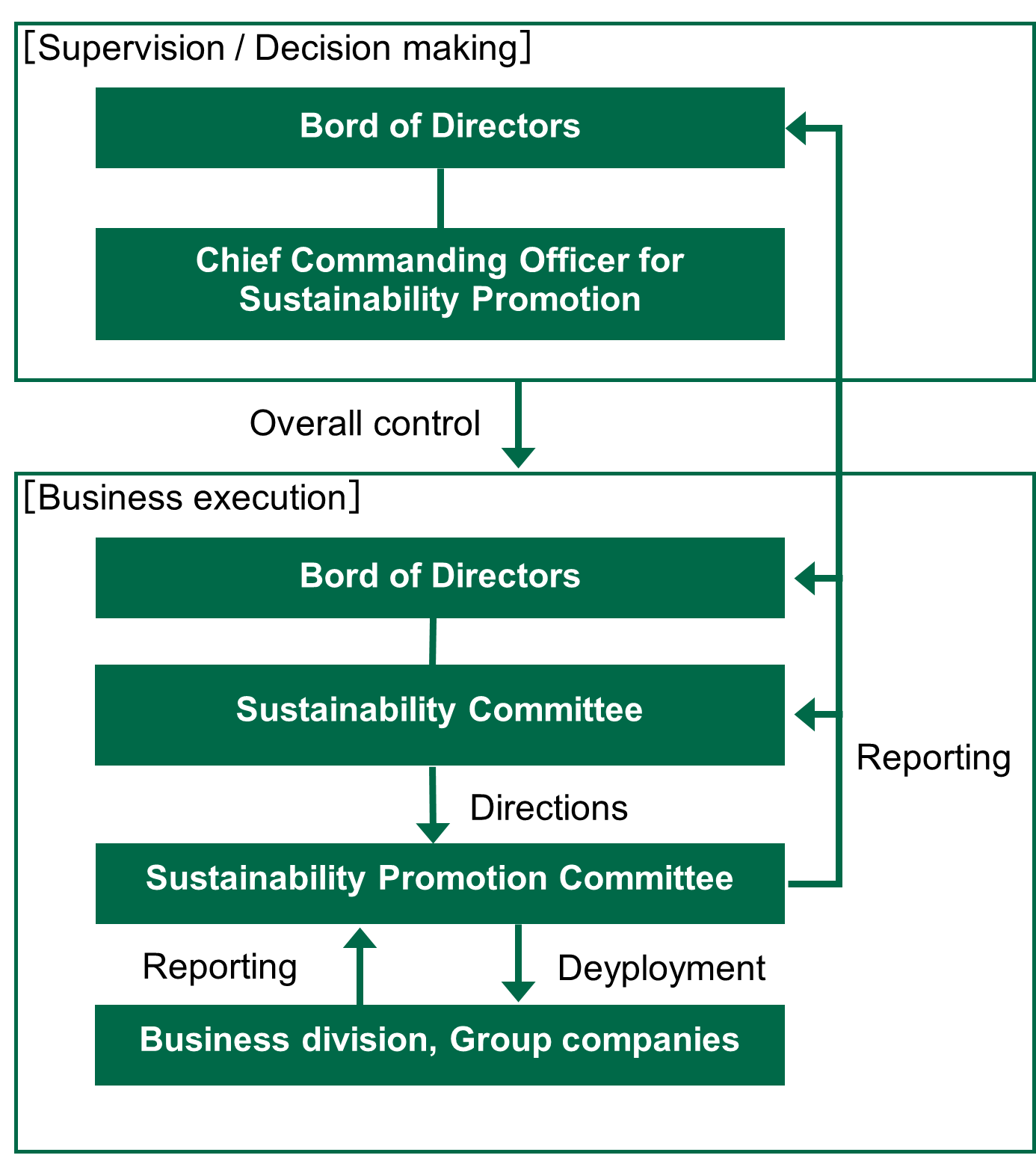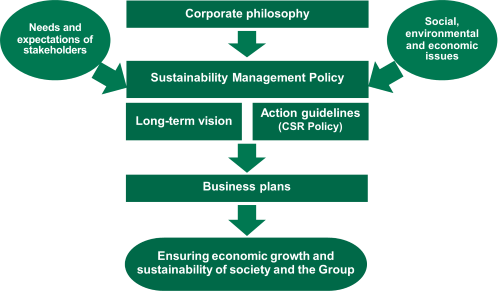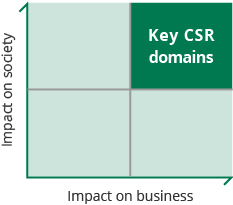Promotion of Sustainability Management
We seek to achieve both economic activity and sustainability by putting our corporate philosophy into practice.
GS Yuasa Group's Sustainability
"Innovation and Growth", our corporate philosophy, is the basis of the GS Yuasa Group's Sustainability management. We believe our mission is to create “innovation” through the development of new technologies and the renewal of business processes without the restrictions of old customs. Accordingly, we aim to achieve sustainable development of business and society, by not only expanding profits, but also contributing to people, society, and the global environment. Furthermore, by responding swiftly through our business to global social issues and the needs and expectations of interested parties, we aim to become a company in which society places long-term trust and hopes for us to remain a presence into the future.
See details of GS Yuasa's philosophySustainability Promotion Framework
The Group has in place a governance framework centering on the Sustainability Promotion Committee under the supervision of the Board of Directors, to promote sustainability initiatives by the entire Group from a medium- to long-term and multilateral perspective. In October 2024, the Group also established a new “Sustainability Committee” comprised of members of the Management Meeting of GS Yuasa International Ltd., its core operating subsidiary, and chaired by a Representative Director. Using these means, the Group is further enhancing its framework for the promotion of sustainability management under the leadership of the highest levels of management.
In this framework, the Company’s President supervises group-wide sustainability activities as the “Chief Commanding Officer for Sustainability Promotion,” and its corporate governance framework centering on the Board of Directors supervises and manages the appropriateness of sustainability management of the entire Group. In addition, GS Yuasa International Ltd. has established a Sustainability Promotion Committee to serve as a conference body responsible for deliberating on sustainability issues, and planning and promoting sustainability-related initiatives, to promote sustainability management throughout the Group.
The Sustainability Committee discusses important matters deliberated at the meetings of the Sustainability Promotion Committee and provides feedback to the Sustainability Promotion Committee on guidelines for implementing effective sustainability management. The Sustainability Promotion Committee utilizes this feedback as the basis for determining response measures and management resources, which are then subject to resolutions at the Boards of Directors of the Company and GS Yuasa International Ltd. before deployment throughout the Group.
When the Group discloses its sustainability information externally, the Sustainability Promotion Committee first reviews the information, followed by a final review and approval by the Board of Directors to ensure the transparency and reliability of the information to be disclosed.
Sustainability Promotion Framework

Sustainability Promotion Process
The Group aims to enhance corporate value and stakeholder satisfaction by implementing a sustainability promotion process based on the corporate philosophy reflecting the Group’s enduring values.
To practice the corporate philosophy, the Group has created the Sustainability Management Policy, which determines its future direction for realizing a sustainable society and enhancing corporate value. This policy indicates the Group’s commitment to emphasize dialogue with stakeholders, contribute to solving sustainability issues, and maintain a strong business foundation.
To achieve the Sustainability Management Policy, the Group is currently operating a medium- to long-term business strategy process (including the Mid-Term Management Plan aimed at achieving the long-term vision and taking into account sustainability issues). The Group also promotes initiatives to address sustainability issues relating to its employee action guidelines (hereinafter the “CSR Policy”), which it has formulated to achieve the Sustainability Management Policy. For both policies, the Group has devised business plans to ensure economic growth and sustainability in society and the Group, taking into account the needs and expectations of stakeholders and social, environmental and economic issues. Furthermore, the Group makes continuous efforts to improve its sustainability initiatives by properly analyzing and assessing the status of responses to significant risks and opportunities related to sustainability issues and reviewing the plans as necessary. For practicing the CSR Policy, the Group has compiled the CSR Code of Conduct to define specific action standards for responsible business conduct, which has been shared with all employees.
Overview of Sustainability Promotion Process

Overview of sustainability initiatives relating to the CSR Policy
- Developing Fair, Transparent, and Sound Business, and Anti-Corruption
- Respect for Human Rights
- Conservation and Improvement of Adequate Working Environment
- Fulfillment of Our Responsibilities to Provide Safe and Secure Products and Services
- Global Environmental Conservation
- Building Better Relationships with Local Communities
- Ensuring Social Responsibility within Our Supply Chain
See details of GS Yuasa’s corporate philosophy, Sustainability Management Policy, and action guidelines
See details of GS Yuasa’s Long-Term Vision
Promoting Company-Wide Sustainability Initiatives
To promote company-wide sustainability initiatives, the Group distributes the document, the Vision Book, that clarifies our corporate philosophy to all our employees. Through the distribution of our Vision Book, which provides a clear overview of our corporate philosophy, sustainability management policies, Long-Term Vision, and action guidelines, the direction, future vision, and values of the Group’s sustainability management are shared with all our employees.
Our CSR Manual, detailing the Group’s policy on responsible corporate conduct (CSR Policy) which serves as action guidelines for sustainability management, is also distributed to all our employees. Behavioral standards underpinning the CSR Policy are clarified for employees in Q&A sections and columns covering key topics, along with a checklist for employee self-assessment of behavioral conformity with the CSR Policy. Our CSR manual, translated into local languages (six languages) that local employees can understand, has been distributed to overseas Group companies. The Group is committed to ensuring that all domestic and overseas employees are cognizant of sustainability issues related to our CSR Policy and is making efforts for the promotion of sustainability initiatives through business activities.
Management of key sustainability issues
Materiality-Related Initiatives
The Group identifies the risks and opportunities relating to the action guidelines (the CSR Policy) aimed at achieving the Sustainability Management Policy and assesses the impacts on its businesses and society to determine key sustainability issues (materiality) concerning the CSR Policy. In addition, the Group has compiled business plans to deal with materiality (the materiality response plans), taking into account such aspects as enhancement of business foundation and corporate value, and has set management indicators and targets to track the progress of the plans. The conference body (the Sustainability Promotion Committee), tasked with promoting sustainability in the Group, regularly reviews and determines materiality and the materiality response plans, taking into account the needs and expectations of stakeholders and sustainability issues. As for significant risks relating to the CSR Policy, the Group implements appropriate responses to them by utilizing its risk management system.
By managing the business process incorporating materiality into the long-term vision and the Mid-Term Management Plan, the Group seeks to improve the management quality of financial and non-financial operations and ensure sustainable growth of businesses and society.
See details of GS Yuasa’s Long-Term Vision and Mid-Term Management PlanMateriality Specification Process
Step 1: Select risks and opportunities relating to the CSR Policy
The Group selects risks and opportunities relating to the CSR Policy, taking into account key issues of the Mid-Term Management Plan formulated based on the Sustainability Management Policy. When selecting risks and opportunities, the Group refers to international guidelines related to responsible business conduct.
Step 2: Identify significant risks and opportunities relating to the CSR Policy
The Group conducts a scoring evaluation on the risks and opportunities selected in Step 1 and identifies the risks and opportunities that may have significant impacts on businesses. Regarding the risks and opportunities with significant impacts, the Group then assesses the impacts of its business activities on society and identifies significant risks and opportunities relating to the CSR Policy.
Domains for identifying significant risks and opportunities relating to the CSR Policy (key CSR domains)

Step 3: Determine materiality
The Group analyzes the risks and opportunities identified in Step 2 and determines key sustainability issues (materiality) relating to the CSR Policy. The Group determines materiality, incorporating the opinions of external experts and other stakeholders, to ensure the appropriateness of materiality.
Materiality and Response Plan
A summary of the Group's materiality response plans and the impact of these plans on society and business are presented in the following table.
With respect to materiality shown in the table, we are conducting operations and management based on the measurable target management and management criteria, make ongoing improvements and perform effective maintenance and management. The details of the plans are periodically reviewed and revised according to changes in sustainability issues and the needs and expectations of stakeholders.
When carrying out the Mid-Term Management Plan, the first year of which is fiscal 2023, we formulated new materiality response plans to address significant sustainability issues. After summarizing the fiscal 2022 materiality response plans and reviewing the materiality, we established materiality response plans for fiscal 2023 and later. In these plans, we not only establish indicators and targets to manage the impact of significant sustainability issues on society, but also assess the impact on business using financial indicators.
Summary of Materiality Response Plans
(Fiscal 2023–2025)
Please scroll sideways
The scope of application may not
cover all Group companies.
materiality response plans





